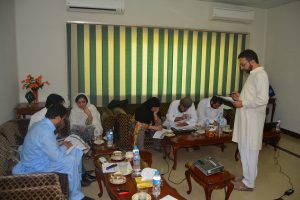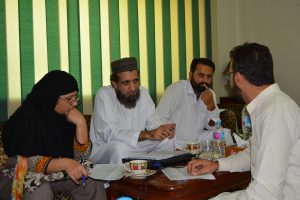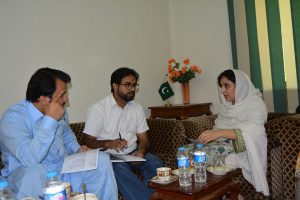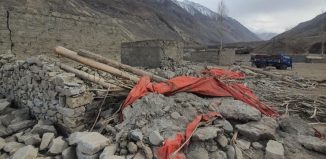Working together with national academia to ensure best results of Academic Fieldwork
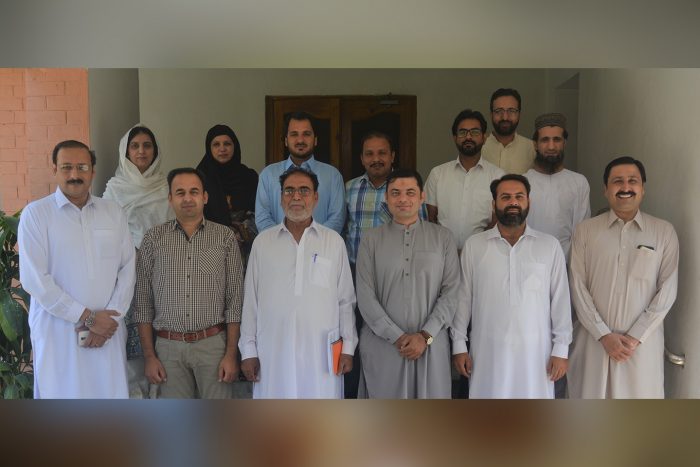
Community World Service Asia’s (CWSA) Quality and Accountability team organized a consultation meeting with selected representatives and officials of the academia community of Pakistan to explore the existing practices of student engagement in field work and to initiate the process of designing a comprehensive guide on “Field Work Practicum”. Field Work Practicum is part of the course work of Social Work Department of Pakistani Universities. This involves field work for practical exposure and experience for a certain period of time. The practicum enables students to connect their theoretical curriculum with practical field work. Universities in Pakistan lack guidelines about student placement, role of external and internal supervisors, ethics and norms for students to learn before going to field, scope and limitation of engaging students with organizations, gauging students’ performance and allocating grades for specific subject area. CWSA will facilitate these Universities in developing guidelines which will support the Social Work Departments with well-defined parameters, roles, responsibilities and plans for student engagement and field work.
The meeting held on June 23rd was attended by eleven faculty members from three universities, including University of Sindh, Jamshoro, University of the Punjab, Lahore and University of Peshawar (UoP). The broader aim of the consultation was to identify the existing practice of field work and form a core team responsible for drafting the guideline and developing a detail plan of the “Field Work Practicum Guide Development”.
Dr. Ibrar, Assistant Professor at the Social Work Department, UoP, welcomed all the participants of the meeting and shared the agenda of the day, while, Khurram Saeed, Community World Service Asia representative, facilitated the consultation and explained the process required to work on the guidelines.
The existing practices of academic field work and challenges faced by students and supervisors in its initial stages of implementation were shared by all participants. Arshad Abbasi, Lecturer at University of the Punjab and Waheed Akbar, Lecturer at University of the Sindh, Jamshoro particularly explained the informal mechanism used by their respective universities for field work and various challenges associated with students and supervisors due to informal arrangements. Some major challenges highlighted were the lack of proper plans, clear objectives and follow up mechanism for student performance, role of internal and external supervisor in coaching and mentoring of students and forms and formats for different levels (Objective setting, student plans, reporting and student assessment).
Each of the three participating universities shared their existing practices and challenges through presentations followed by a Question & Answer session. Participants further shared solutions to challenges faced in field work activities with each other and discussed steps to develop the first draft of the guidelines.
Rizwan Iqbal, Community World Service Asia staff member, explained the Core Humanitarian Competency Framework (CHCF) to the participants and how the CHCF can contribute to the development of competency-based student placement programs. In a group exercise, each participant briefly studied the core competencies and identified important features to be incorporated in the program and the practicum. The CHCF was found to be useful and applicable by most of the academia members present at the meeting.
Nominations were requested to form a core committee to begin work on the different stages and drafts of the field work practicum guide. The core committee will receive nominations from universities by the end of July.
Dr. Ibrar formally concluded the session and appreciated the vigorous participation of all the participants and their valuable contribution at this initial stage of development of the field work practicum guide. Nasira Nasreen, Lecturer, Peshawar University, shared,
Waheed Akhtar, Lecturer at University of Sindh, Jamshoro highlighted the importance of the meetingI am quite impressed by the idea of developing the field work practicum guide as students face challenges from departments and immediate supervisors when conducting related activities. This guide will help improve the processes of field work, resulting in productive outcomes.
as this experience sharing gave them an opportunity to learn new practices to improve their field work exercises and activities. A standard document will further clarify the processes for students and relevant departments, which will allow efficient and smooth working.





